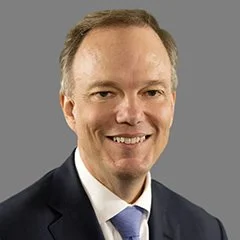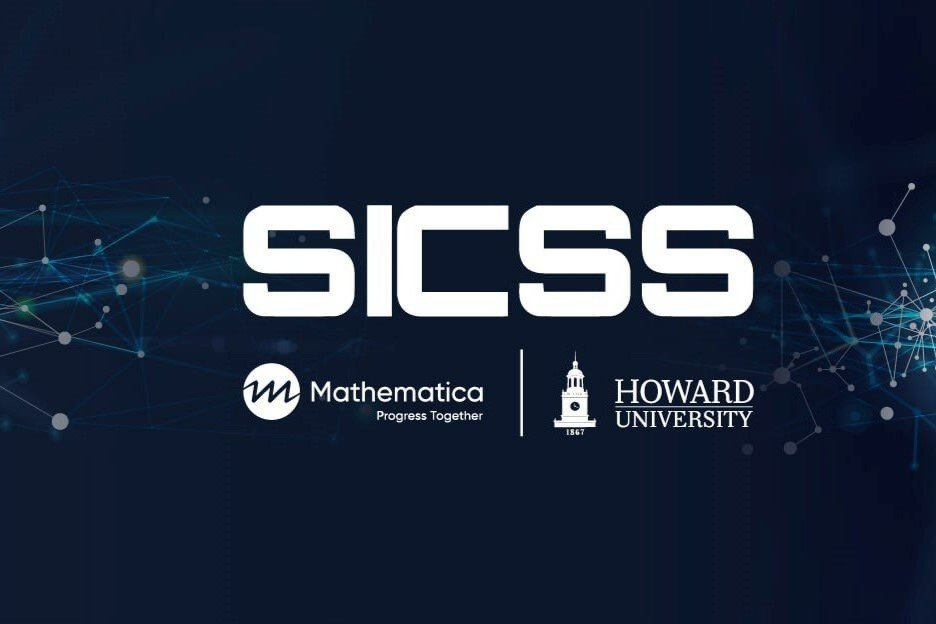Mathematica’s Paul Decker PhD Delivers Closing Plenary Address for SICSS-Howard/Mathematica 2021
This blog post is the seventh of nine in a series called “The Future of Computational Social Science is Black” about SICSS-Howard/Mathematica 2021, the first Summer Institute in Computational Social Science held at a Historically Black College or University. To learn more SICSS-H/M read the first post in the series.
Paul Decker
On the final day of SICSS-Howard/Mathematica 2021 Paul Decker addressed the participants as the final Closing Plenary Speaker. Decker has served as President and Chief Executive Office of Mathematica since 2007, having joined the organization twenty-four years prior as an analyst fresh out of graduate school. He is a nationally recognized expert in policy research, education, and labor. Mathematica is at the forefront of using data to advance research, guide policy, and address social challenges ranging from health and education to employment and criminal justice. Mathematica improves programs and policies that promote public well-being and advance diversity, equity, and inclusion using quality data and cutting edge policy research tools, with Decker overseeing its expanded operations, expertise, and scope.
Although his closing address was meant to start at 4:30pm local time, Decker joined SICSS-H/M participants four hours early to listen to research presentations. Participant academics developed original projects utilizing computational social science skills presented through the institute over the past fourteen days. For the entirety of the four hours, Decker was engaged in the participants’ presentations, listening attentively, jotting down notes in a journal in front of him, asking questions, and offering a generous knowing smile when they discussed the technical challenges they faced.
After participant presentations, the microphone was passed to Akira Bell, Senior Vice President and Chief Information Officer of Mathematica. In 2019, just one year into her tenure with Mathematica, Bell presented the idea of a SICSS site held at a historically black university to Decker. Decker immediately agreed and, as Bell noted, this was before 2020 made “diversity, equity, and inclusion” urgent buzzwords among other corporate executives; which further affirmed the value that Mathematica and Decker placed in staff pursuing their interests.
Decker started his talk by thanking the organizers and partners: Bell for her vision and leadership; SICSS-Howard/Mathematica lead organizer Naniette H. Coleman for her stewardship of the institute (he paused to ask everyone to applaud her, to more-than-enthusiastic agreement); and Howard University for being a partner that was “replacing barriers with pipelines...to bring more students of color to the STEM fields.”
Acknowledging the rigor of the two-week program, Decker kept the air light as he talked about how proud he was of the work participants accomplished. Addressing the participants directly, he conveyed his hope that SICSS H/M was a “transformational experience” and thanked them for inviting him to their presentations. He was encouraged by the curiosity, passion, and intentionality with which they imbued cutting edge social science research tools.
Akira Bell & Paul Decker
Decker reflected on the history of computational social science research methodology. He recounted that when he joined Mathematica as a newly minted PhD in the 1980s, data was static and scarce; he shared how his training in causal inference was limited in the policy world. Furthermore, the large portion of research was carried out by a tiny percentage of the population, and research was not accessible or understandable to policymakers. Mathematica was one of the few places where policy and academic research could intersect.
Decker describes the present as a “whole new era of policy research.” Dynamic data is available at our fingertips, and with the new technology, we can leverage a variety of data types, such as videos. It became possible to conduct cheaper, quicker, and more accessible research. The traditional rivalry between computational science and social science became counterintuitive to the growing realization that combining the strengths of both fields would better prepare us to address the world’s most complex problems. This tied in with the news that broke towards the end of participant presentations: Derek Chauvin, who had been convicted of the murder of George Floyd, was sentenced to 22.5 years in prison.
Decker noted that while systemic racism was not new (acknowledging that in a room full of scholars of color, he did not need to directly tell them), what was new was the availability of evidence. The video of George Floyd’s murder was impactful data. It plainly showed the reality of Black Americans’ experience with police institutions. “Rigorous and objective evidence will not fix racial equity but is important to the journey,” he stated.
In another anecdote on how data could be tied in with social progress, Decker recounted one of his first projects at Mathematica. His team was asked to identify unemployment insurance applicants with long predicted durations of unemployment. At the time, there was a concern that this would lead to racial bias in the model. The solution proposed by the Department of Labor was to ignore race--that not using it should mean that the model would not carry bias. As a participant noted in the chat, it was colorblind racism. Decker lamented that a more thoughtful approach would have led to a different outcome. He then related it to the issue of bias in artificial intelligence today. Artificial intelligence models can engage in the same colorblind racism, and one way to be more intentional about these models is to bring in a new generation with diverse perspectives. This is what SICSS-Howard/Mathematica aimed to do: “One of the key things of SICSS is that we use emerging technology to combat systemic racism — to use [artificial intelligence] to fight inequality instead of perpetuating it.”
He shared that it was Mathematica’s 2035 goal to use evidence to promote greater equity in policy and that, given the caliber of the participants’ research projects, he was hopeful people would be able to live in the worlds of both computational science and social science to spur data-driven action. “Having problem solvers who can both write machine learning code and bring in perspective...who could bring their diverse backgrounds, lived experiences, and passions...would make sure that the research is really helping public well-being.” He expressed his hope that participants would use the knowledge gained and community built during the two weeks of SICSS to implement data-driven solutions and to be at the forefront of addressing issues of injustice and inequity with the computational social science toolkit.
Participants joined him excitedly for SICSS-H/M’s very last live Q&A session. They asked him how to operate in spaces where one type of data — quantitative or qualitative — is preferred. Decker shared that rigorous data does not necessarily equate with quantitative data. Rigorous data means it reflects the truth and reality. This means that we need both types. He pointed out that “we cannot ignore the reality of the communities being studied in favor of purely quantitative data.” Paul Decker’s talk officially concluded SICSS H/M 2021.
Until next year!
For more information about SICSS-Howard/Mathematica 2022 and the application procedure, check out our website. Also follow us on Twitter, like us on Facebook, and join our email list!
About the authors
Ava Wu received her Bachelor of Arts in French and Molecular & Cell Biology from the University of California, Berkeley. Ava served as a research assistant and project lead in the AAC&U award-winning, Berkeley based Interdisciplinary Research Group on Privacy under PhD Candidate Naniette Coleman. Her professional interests lie at the crossroads of molecular biology, law, international affairs, and ethics. In her free time, she is learning Modern Greek and Mandarin Chinese. Ava served as an Event and Communications Assistant for SICSS-Howard/Mathematica 2021, curating social media and video content.
Naniette H. Coleman is a PhD candidate in Sociology at the University of California Berkeley and a multi-year UC-National Laboratory Graduate Fellow (Los Alamos). She is the only social scientist selected for this distinction in the history of the program. Naniette is also the founder and lead organizer of the first Summer Institute in Computational Social Science at a Historically Black College of University, SICSS-Howard/Mathematica 2021. Naniette’s work sits at the intersection of the sociology of culture and organizations and focuses on cybersecurity, surveillance, and privacy in the US context. Specifically, Naniette’s research examines how organizations assess risk, make decisions, and respond to data breaches and organizational compliance with state, federal, and international privacy laws. Naniette holds a Master of Public Administration with a specialization in Democracy, Politics, and Institutions from the Harvard Kennedy School of Government, and both an M.A. in Economics and a B.A. in Communication from the University at Buffalo, SUNY. A non-traditional student, Naniette’s prior professional experience includes local, state, and federal service, as well as work for two international organizations, and two universities.







